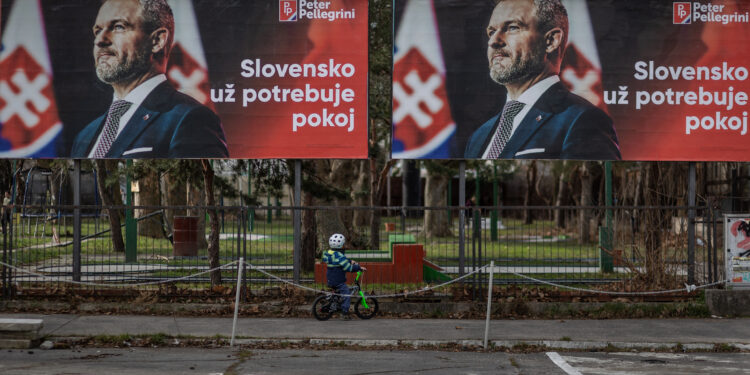Brussels – Slovakia on the eve of history, to see which path it is heading down. Everything is ready in Bratislava for tomorrow’s presidential elections (March 23), which could bring nationalists into control of the country’s major institutions. HlLAS-SD leader and Speaker of the National Parliament, Peter Pellegrini, architect of the red-black government led by Robert Fico, will try to win the highest institutional office less than six months after the parliamentary elections that marked the first significant turning point for Slovakia.

Nine candidates will compete tomorrow to succeed the pro-European Zuzana Čaputová, who has opted not to run again for a second term as president of the republic. But the real contenders on whom the spotlight will be on are two: the leader of the Social Democratic force in government with two pro-Russian forces (the Social Democrats of SMER-SSD and the far-right Slovak National Party) and former European Affairs Minister Ivan Korčok, on whom the centrist and liberal opposition parties will converge to try to curb the advance of the nationalists. The endorsement of PM Fico’s party has also come out in support of Pellegrini, while the far right will leave its voters free to vote in the first round, most likely converging on the government ally in the event of a ballot on April 6. According to polls, Pellegrini would be slightly ahead of Korčok. However, the match seems wide open, with the runoff scenario still providing no indication of which way Slovak voters will go.

From left: SMER-SSD leader and Prime Minister of Slovakia Robert Fico and HLAS-SD leader and presidential candidate Peter Pellegrini (credits: Vladimir Simicek / Afp)
If Pellegrini can count on the strength of the majority, Korčok could instead take advantage of the wave of protests that have affected Slovakia’s major cities in recent months, particularly after the parliament’s green light last February 8 to the reform of the Criminal Code. Wanted by Pellegrini’s ally Premier Fico, the reform includes the abbreviation of the statute of limitations for the most severe crimes (from 5 to 20 years) and the abolition of the office of the special prosecutor dealing with crimes such as those related to organized crime and high-level corruption (with the return of cases to the hands of prosecutors in regional offices). The opposition’s denunciation is of an attempt to weaken the judiciary through a “mafia reform package”, which favours members of Fico’s party and high-level government supporters in a country where the current prime minister himself had to resign in 2018 following the murder of journalist Ján Kuciak and girlfriend Martina Kušnírová, who had exposed links between the ‘ndrangheta and the Slovak elite (including members of his SMER party).
This reform of the Penal Code could open a clash in Brussels similar to the one in Hungary, which led to activating the conditionality mechanism on the rule of law. At the time of the presentation of the draft, the EU Commission, the European Public Prosecutor’s Office (EPPO) and the EU Parliament had warned Bratislava that changes to the Penal Code could “seriously” compromise the level of protection of the EU’s financial interests in Slovakia, specifically in the area of corruption, fraud, and mismanagement of EU funds. In this scenario, countermeasures in Brussels would be inevitable. After it enters into force on March 15 (with some slight modifications to meet the objections of the three EU institutions), the EU Commission is expected to evaluate the reform as a whole and decide whether there are still concerns that warrant action ranging from infringement proceedings to activation of the rule of law conditionality mechanism.
The Red-Black Slovakia
After last year’s September 30 elections in Slovakia, the pro-Russian Social Democracy of SMER-SSD emerged as the leading force in parliament, winning 22.95 per cent of the vote. In second place was the Progressive Party of the Vice President of the EU Parliament, Michal Šimečka (17.96), and in third place was HLAS-SD (14.70). With only four other parties above the 5 per cent threshold (the conservatives of OĽaNO, the Christian Democratic Movement, the liberals of Freedom and Solidarity, and the eurosceptic pro-Russian right-wing Slovak National Party) it was immediately apparent that the 27 Pellegrini MPs would be instrumental for the formation of any majority. There were two options: either a pro-European and pro-Ukraine coalition (in which he could also be the premier) with progressives, Christian Democrats and the Liberals, or an alliance with the two pro-Russian forces, the Social Democrats of SMER and the extreme right-wing Slovak National Party.

From left: the leader of the Slovak Progressive Party, Michal Šimečka, and the Prime Minister of Slovakia, Robert Fico (credits: Vladimir Simicek / Afp)
The game seemed wide open until early October, when Pellegrini convened a press conference to announce his support for the second option, denouncing alleged “ideological problems” between progressives and Christian Democrats in a hypothetical governing majority (however, quite stable with 82 deputies). In contrast, Pellegrini, former prime minister between 2018 and 2020 and leader of the party founded in 2020 after the split from SMER, assured that “with our presence, we will ensure that Slovakia’s membership in the EU and NATO will not be jeopardized.” In other words, HLAS-SD wants to pose as a guarantee of foreign policy continuity through constant blackmail to SMER (42 MPs) and right-wing nationalists (10) to leave the coalition otherwise.
However, the decision to initiate a government between the social democratic left and the extreme nationalist right in the country also had consequences at the European level. On October 12, the Presidency of the Party of European Socialism (PSE) decided to suspend the membership of the Slovak SMER-SSD and HLAS-SD parties after the forces led by Fico and Pellegrini, respectively, chose the camp: “The Memorandum of Understanding signed by the three parties is not compatible with the progressive values and principles of the European family of Socialists and Social Democrats.” Similarly, the Group of the Progressive Alliance of Socialists and Democrats in the European Parliament has opted to suspend the membership of the three Slovak MEPs (Monika Beňová and Katarína Roth Neve’alová, both in the SMER-SSD quota and Róbert Hajšel, also elected in 2019 from the ranks of Fico’s party and now an independent). Major concerns about policies that “have no place in the progressive family” are related to Russia’s war against Ukraine, migration, the rule of law, and the rights of the Lgbtq+ community.
English version by the Translation Service of Withub







